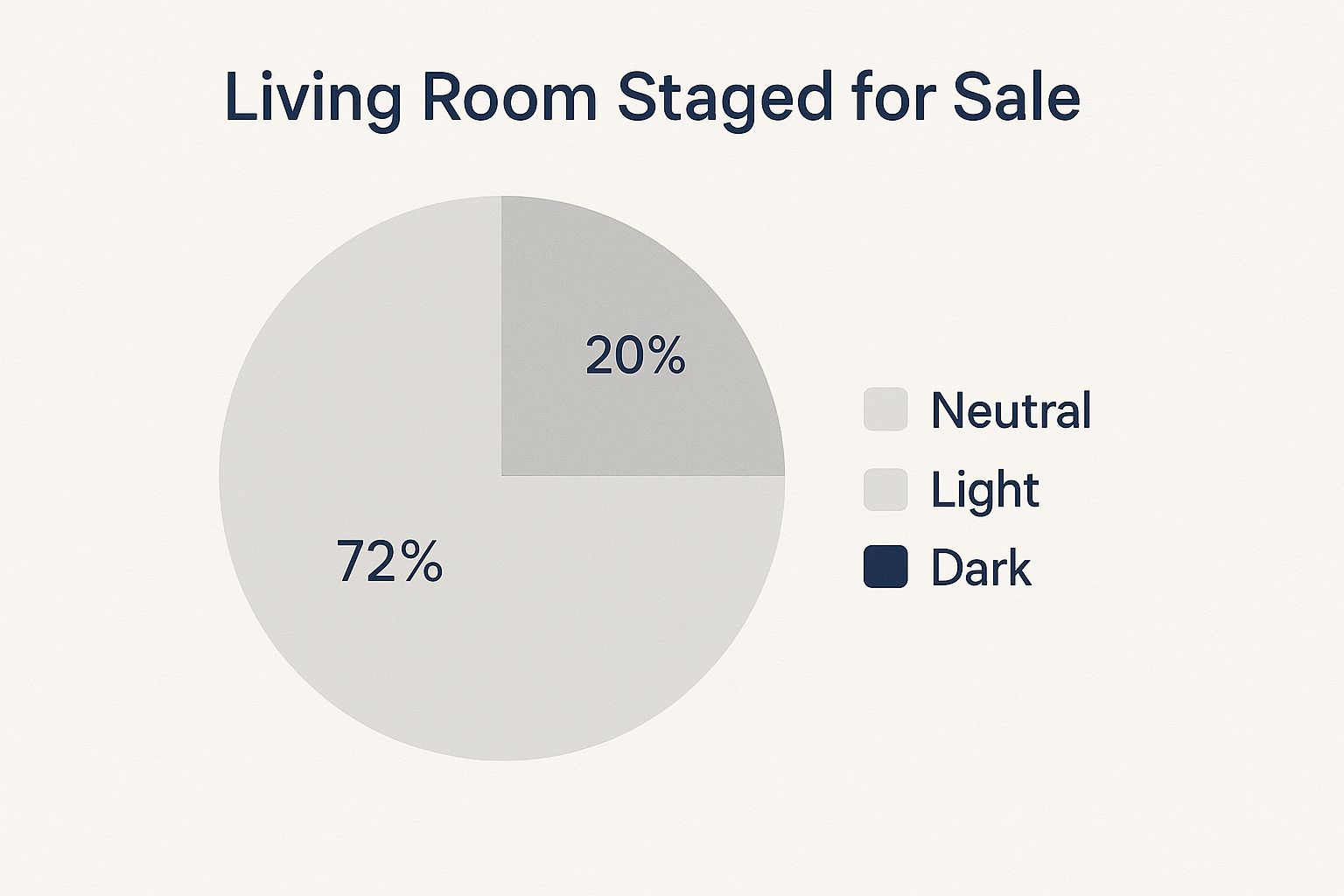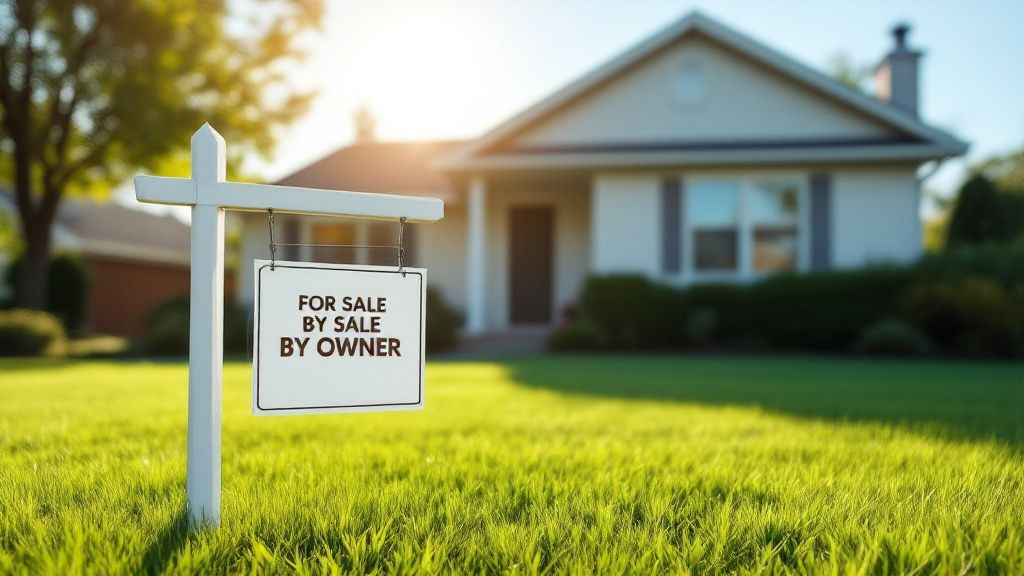So, you’ve decided to sell your house without a realtor. The best approach to achieve this depends on which aspects you consider most important. Are you ready to put in the work for maximum financial gain? The For Sale By Owner (FSBO) method represents the most suitable option for you. The process of selling through a cash buyer provides you with a simple method to complete your sale quickly.
Finding the Right Path to Sell Your Home
You must create a strong plan when selling your home independently because this process grants you complete control over the situation. Your financial goals together with your current circumstances should direct the selection of your path. Success demands you to understand your available choices and select the most suitable path according to your unique circumstances.
You have three main paths to choose from which offer different advantages and disadvantages.
- For Sale By Owner (FSBO): You’re the captain of the ship. The real estate agent manages every aspect from price determination to property promotion and buyer negotiation and final contract processing. This path offers the biggest potential payday by cutting out agent commissions, but it’s also the most demanding in terms of your time and energy.
- Selling to a Cash Buyer: This is the express lane for selling. House buying companies will acquire your property by accepting its present state. The process provides immediate results and you avoid all the complications that come with home repairs and open house events and financing breakdowns. The trade-off is that the offer might be a bit less than full market value.
- Using a Flat-Fee MLS Service: The system operates as a hybrid model. Your home will be listed on the Multiple Listing Service (MLS) through a single payment to a company which serves as the primary database that real estate agents access. Your property will receive exposure to a vast pool of buyers through this service yet you must handle all aspects of showing properties and negotiating deals and paperwork processing.
Your home must always be ready for showings regardless of which direction you choose to pursue. A successful presentation will create the complete transformation.

Potential buyers will find a clean space with no clutter and neutral colors much more attractive as you can see. The virtual tour enables buyers to create mental pictures of their potential home which serves as an essential process for both FSBO and traditional home sales.
Comparing Your Options for Selling Without an Agent
We should analyze these various approaches to understand their differences. The methods differ in their level of work required and their speed of completion and the final price obtained.
| Method | Typical Sale Price | Selling Speed | Seller Effort Required |
|---|---|---|---|
| For Sale By Owner (FSBO) | 95%-100% of Market Value | 30-90+ Days | High |
| Flat-Fee MLS Listing | 95%-100% of Market Value | 30-90 Days | Medium-High |
| Cash Buyer | 70%-90% of Market Value | 7-14 Days | Low |
The table above presents the fundamental trade-off which shows your market value proximity depends on your willingness to work harder. The guaranteed quick closing and simplicity of this option make it worth considering if you want to save a bit more money.
Understanding the Trade-Offs
Every method needs to strike a balance between different elements. The FSBO process can help you save money but learning the process requires effort and you must avoid legal problems through proper knowledge. It’s a good idea to see how the pros do it; check out listings like this property for sale in Preston, Lancashire to get a feel for effective marketing.
Some homeowners need to make their decision because they have urgent money problems. Knowing your alternatives together with their consequences becomes essential when you face stressful situations. Understanding the consequences of mortgage default can make it much clearer whether a quick cash sale is the right strategic move to protect your financial future.
So You Want to Sell Your House Yourself? A Realistic Look at FSBO
Have you started to think about selling your home through FSBO? The decision requires courage because the potential savings from agent commission fees seem very attractive. Before you buy a yard sign you need to understand that selling your home involves more than just putting up a sign. The role requires you to act as a listing agent and marketer and negotiator and transaction coordinator all at the same time. The road ahead brings fulfillment yet the path requires dedication.
The biggest carrot, of course, is the money. You get to skip the typical 2.5% to 3% commission you’d pay a seller’s agent. The maximum amount you can receive is $12,000 for a property worth $400,000. You get to retain your entire commission but you must handle all the details of this complicated financial deal.
What the FSBO Landscape Really Looks Like
The first step requires us to base our discussion on actual facts. The FSBO market has been decreasing in size while people try to save as much money as possible. The U.S. home sales records show that only 6% of properties in major markets sold through owner sales during 2024.
The actual problem arises because 30% of these sellers chose FSBO to avoid paying commissions yet 75% of them ended up paying commissions to buyer agents anyway. Why? Because most serious buyers are working with an agent, and you need to be willing to “cooperate” to get those buyers through your door.
This isn’t to talk you out of it. Not at all. The purpose of this document is to get you ready. The knowledge that you must pay a buyer’s agent commission from the start enables you to create a more accurate budget and price plan.
The Actual Work Involved in an FSBO Sale
The process of selling your home requires you to perform multiple tasks at the same time. Think of it less like a simple sale and more like managing a complex project from launch to completion.
Here’s a snapshot of what’s on your plate:
- Pricing it Right: You must examine recent comparable sales (comps) to establish a price that matches market rates. The price of your home needs to find the right balance because an excessive price will drive buyers away while a low price will minimize your potential earnings.
- Marketing & Staging: This is huge. The responsibility for professional photography and property description creation and home staging to help buyers visualize their future residence rests with you.
- Getting the Word Out: The process of listing your home on Zillow requires your direct involvement. You’ll also have to decide if a flat-fee MLS service is worth the cash to get your listing in front of agents.
- Managing Showings: The phone will start ringing immediately. Your schedule will be full of phone calls and appointment scheduling and open house hosting while you must keep your home clean and ready for showings at all times.
- The Art of the Deal: This is where it gets tough. You need to evaluate offers, deal with contingencies, and negotiate counter-offers without letting your emotions get in the way.
- Navigating the Paperwork: You must verify that all contracts and disclosures and addendums maintain complete legal accuracy. The process needs you to hire a real estate attorney for the protection of your interests.
Most FSBO sellers face emotional challenges during negotiations which become their primary obstacle instead of dealing with marketing tasks. The buyer’s agent functions as an expert professional who operates to defend their client interests. You’ll be going head-to-head with them, representing yourself.
If that list makes your head spin, it’s a good time to remember you have options. Homeowners who choose speed and certainty over maximum profit should explore different options. Selling directly to a cash buyer is one such option. The FSBO method serves as one option among many but learning how to sell your house quickly provides a useful plan when the process starts to become too difficult.
Pricing Your Home to Maximize Profit
Selling your home at the right price point tends to be the most essential and nerve-wracking aspect of the process. The market will hold onto your property for several months if you set your asking price too high because buyers will suspect there is something wrong with it. The trick is finding that perfect middle ground that gets serious buyers in the door and puts the most money in your pocket.
To do this, you have to temporarily stop thinking like a homeowner and start thinking like a market analyst. You need to separate yourself from the memories and your personal valuation of the home even though it will be difficult. The market does not care about your past family celebrations because it evaluates your home’s worth based on the present market value.

Run Your Own Comps
The first step requires you to create your own Comparative Market Analysis (CMA). The process requires you to find homes that have recently sold in your local area and these sales are known as “comps” which should match your property as closely as possible.
You need to study properties that have matching characteristics in these specific areas:
- Square footage and lot size
- Bedrooms and bathrooms
- Age and overall condition
- Key features or recent upgrades (like a new kitchen or pool)
Search on Zillow and Trulia to locate this data. The key is to look at sold properties from the last three to six months, as that gives you the most current pulse on your neighborhood’s value. Search for three comparable properties to determine an accurate price range.
When to Shell Out for an Appraisal
Feeling unsure? Your home stands out as a unique property because it lacks any comparable properties in the area. Spending a few hundred dollars on a professional appraisal will prove to be a wise investment at this point. A licensed appraiser will give you an objective, official valuation based on data, not emotion.
Your appraisal functions as more than a number because it provides you with power. The report serves as a strong resource which you can use to prove your asking price when you negotiate with buyers. The tool proves to be an excellent resource because it helps you avoid pricing errors which could save you thousands of dollars.
Now, let’s be realistic about the numbers. Data shows that homeowners receive different amounts of money when they sell independently compared to when they use an agent. FSBO homes have sold for an average price 29% lower than agent-represented homes. The average sale price for FSBO homes in 2024 reached $189,000 while properties sold through agents achieved an average price of $265,000.
The condition of your home also plays a massive role. The valuation of your property requires you to understand the potential price difference between selling as-is and after completing any necessary repairs before setting your asking price. The information will help you determine if you should invest in property improvements before putting it on the market.
The method exists for people who want to avoid pricing decisions and home repairs and showings. Selling directly to a cash buyer means you can bypass the entire process. If you want to pursue this path then Eagle Quick For Cash will present you with a no-obligation cash offer that guarantees a sale without any uncertainty.
Creating a Marketing Plan That Attracts Buyers
The moment you decide to sell your home you transition from being a homeowner to becoming the chief marketing officer of your property. Your primary objective involves generating enough interest to attract continuous waves of serious buyers who will visit your property. The good news? You don’t need a massive budget. You need to develop a clever plan that uses multiple methods.
Your marketing plan will contain a mix of digital marketing techniques and traditional marketing methods. Your property needs to gain visibility so you have to find ways to connect with potential buyers since you lack an agent’s existing network.
Mastering Your Digital Presence
Let’s be honest: in today’s market, your home’s first showing almost always happens online. The foundation of a strong digital presence begins with creating an attractive listing because it stands as an essential requirement for success.
- Photography is Everything: Your smartphone is probably more than powerful enough for this. The trick is to shoot in bright, natural light, focusing on clean and decluttered spaces. Stand in the corner of a room to get wide angles that show its true size. Real estate website users depend on photos as their primary resource for property search according to 41% of buyers.
- Tell a Compelling Story: The description of your property should accomplish more than just presenting its features. The description needs to create an image of daily existence in the home. Use descriptive language instead of “big backyard” by saying “ideal space for hosting summer barbecues and playing soccer on weekends.” Mention the morning sun flooding the kitchen or the quiet, tree-lined street.
Your listing needs to be finished before you start showing it to potential buyers. Start by posting on free platforms like Zillow and Trulia, which both allow FSBO listings.
The system requires you to choose a flat-fee MLS service because this will increase your reach. The service requires a few hundred dollars to list your home on the Multiple Listing Service (MLS) which serves as the primary database used by most real estate agents. The platform enables you to reach out to buyer’s agents who will then bring their clients to your property.
Effective Offline Marketing Strategies
The basic methods of marketing keep their power to attract attention. These simple but effective tactics can capture local interest and drive traffic that your online listings might otherwise miss.
A professionally designed yard sign functions as a permanent salesperson which operates throughout the entire day and night. Your sign needs to be big enough to see from the road and it should have a working phone number displayed. You can find excellent printing services by exploring various real estate marketing resources online.
Organizing an open house event with proper planning will allow you to collect many potential customers at once. Schedule your open house for a weekend afternoon and promote it through online listings at least seven days before the event while preparing property flyers for visitors to take home.
The entire marketing process demands substantial time investment and extensive work efforts. The market presents different alternatives for sellers who require fast and direct transaction processes. If you’re looking into how to sell your house in 5 days, the direct sale option provides a more appropriate solution for your needs because it delivers fast results and guaranteed outcomes.
Your marketing plan will determine your success in the upcoming marketing challenge. The process becomes easier when you choose to sell directly to a cash buyer because you avoid all the steps of marketing and showing your property.
Navigating Offers and Closing Your Sale

Okay, this is where it all gets real. The moment your offer arrives in your inbox you must transition from marketing tasks to full-time negotiation work. The process of selling a home requires most people to experience their highest level of anxiety during this particular stage of the process.
The secret is to stay calm and analyze every offer methodically. The important details exist beyond the initial large number which appears at the beginning of the page.
A great offer needs to provide more value than just a high monetary value. You must examine the buyer’s contingencies because these are the requirements that need to be fulfilled before the sale can be completed. The big three are almost always financing, the home inspection, and the appraisal. An all-cash offer without any conditions usually represents a safer bet than a higher offer that comes with the risk of falling through if the buyer cannot secure financing.
Evaluating Offers and Crafting a Counter
When you get an offer, take a minute. Don’t rush. The analysis requires you to examine every individual part. The analysis requires you to examine the buyer’s initial deposit because a larger amount indicates greater commitment and you should also evaluate their proposed closing timeline and any additional conditions they have included in their offer.
Your offer needs to be improved if the buyer’s response does not meet your desired price point. This isn’t a fight; it’s a negotiation. The discussion needs to reach a solution which benefits all participants involved. You have the option to negotiate the price or request the buyer to shorten their inspection period. The closing date can be adjusted to match your preferred moving timeline. The system needs to prevent all threats to your financial assets while avoiding any negative effects on your current customers.
Your first offer is rarely your best one, but how you respond to it sets the stage for everything that follows. You need to maintain professionalism in all your communication and keep your counter-offer in written format.
According to statistics about 24% of FSBO properties find buyers during their first week on the market. That’s a lot faster than the 11% of agent-listed homes. Studies reveal that 38% of FSBO sales occur because the seller already understands the buyer. The negotiation process will extend if you do not have a pre-existing buyer for your property. You can dig into more stats on FSBO sales timelines to see what to expect.
The Closing Process and Your Legal Team
Once you and the buyer have a signed agreement, you’re officially in the closing period. The process requires you to move from solo work to collaboration because this stage involves all the critical legal and financial tasks. You need to bring in the pros.
The list below shows the professionals who require your assistance at this moment:
- A Real Estate Attorney: The attorney will create and examine all legal documents to guarantee your contract stands firm and you receive full protection. The money you spent was well worth it.
- A Title Company: They’ll run a title search to verify you have the clear right to sell the property. The final closing day requires two people to handle both the financial exchange and property ownership transfer.
The buyer will use this time to bring their home inspector and mortgage appraiser to their property. The inspection process typically reveals minor issues so you should avoid becoming stressed about them. Just be ready to negotiate again, either by agreeing to make some repairs or offering the buyer a credit.
The final stage of the sales process demands both precise communication skills and appropriate professional expertise to achieve success.
The Cash Sale Alternative: Speed, Simplicity, and a Done Deal
If the thought of juggling marketing, showings, and legal paperwork on your own feels like too much, there’s another route you can take. Selling your home to a cash buyer presents a unique selling experience which operates outside traditional real estate methods because it focuses on quick transactions and guaranteed deals.
This approach sidesteps the open market entirely. The sale process becomes more efficient when working with a direct cash buyer. Forget about the weeks of prep work, the endless showings, and the back-and-forth negotiations.
Is a Cash Sale the Right Move for You?
The method does not suit every homeowner yet it proves beneficial in certain circumstances. It’s an especially powerful option if you:
- Are on a tight timeline because of a new job, a divorce, or other urgent financial needs.
- Inherited a property and want to sell it quickly without getting bogged down in repairs or maintenance.
- Own a “fixer-upper” and don’t have the time, money, or desire to handle major renovations.
- Simply want to avoid the stress and uncertainty that comes with a traditional sale.
The cash sale method helps buyers overcome the primary obstacle which typically causes real estate transactions to fail: financing issues. When your buyer is paying with their own funds, you don’t have to worry about a bank loan getting denied at the last minute. The financial burden has been completely removed from your shoulders.
Now, the trade-off is that a cash offer will almost always be below the top market value you might get from a traditional sale. Your final price may be lower than expected but the transaction will close quickly and without any additional costs.
The guide offers more information about cash home sales if you believe this method suits your current situation. The program offers a simple way for homeowners to leave their property for those who want to sell their home quickly.
Common Questions About Selling a House Yourself
The FSBO process naturally generates various inquiries. The most effective method to determine if this path suits you requires obtaining high-quality answers. We will address the typical questions that homeowners have when they consider selling their property without hiring an agent.
How Much Money Will I Actually Save?
This is the big one, right? The main draw for FSBO is saving on commission. Your home sale transaction will probably exclude the need to pay the seller’s agent commission which typically ranges between 2.5% and 3% of the property’s sale value.
But hold on—it’s not a straight 3% savings. The buyer’s agent commission will most likely still need to be paid at a rate between 2.5% and 3%. Most buyers have agents, and those agents expect to get paid. The buyer’s agent will not display your property to their clients unless you provide them with a commission.
The total cost requires you to include your personal expenses for professional photography and yard signs and online listings and attorney fees. The total amount you will pay including FSBO costs might not reach your expected savings because FSBO properties tend to sell for lower prices.
What’s the Single Biggest Mistake FSBO Sellers Make?
Hands down, the most common and damaging mistake is overpricing the home. It’s completely understandable—you love your home and have an emotional connection to it. The emotional bond between you and your property creates difficulties when trying to evaluate its market value objectively.
Sellers often price their home based on what they want or need to walk away with, instead of what the current market data says it’s actually worth. A home that is priced too high will remain unsold on the market. The process of buying turns into weeks which causes buyers to become doubtful.
A property enters into a state of “stale” when it stays on the market for an extended period of time. The buyer will ask about the problems with the property. The market stigma will force you to drop your price more than what you would have had to if you had priced your property correctly from the beginning.
Do I Really Need to Hire a Lawyer?
The home selling process needs legal representation in every state although some states allow sales without lawyers yet I would never suggest anyone take that risk. A good real estate attorney is your safety net.
The experts specialize in reviewing complex sales contracts to protect your financial interests throughout the entire closing process by verifying that all your disclosures and documents remain legally valid. The fee for an attorney is a tiny fraction of the home’s price, and it buys you an enormous amount of security and peace of mind.
The process of managing multiple tasks becomes overwhelming but you should understand that you have the ability to succeed. Selling to a cash buyer offers a completely different way to sell. Companies like Eagle Cash Buyers can provide a fair, no-obligation cash offer so you can sell your house as-is. The sale process requires no repairs or staging or showings or agent commissions.
You can get a free offer by visiting us at https://www.eaglecashbuyers.com.





